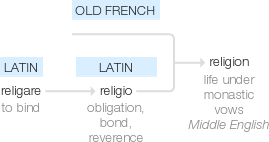Religion
Middle English (originally in the sense ‘life under monastic vows’): from Old French, or from Latin religio(n- ) ‘obligation, bond, reverence’, perhaps based on Latin religare ‘to bind’.
wiktionary
From Middle English religioun, from Old French religion, from Latin religiō(“scrupulousness, pious misgivings, superstition, conscientiousness, sanctity, an object of veneration, cult-observance, reverence”). Most likely from the Indo-European root *h₂leg with the meanings preserved in Latin dīligere and legere (“to read repeatedly”, “to have something solely in mind”).
etymonline
religion (n.)
c. 1200, religioun, "state of life bound by monastic vows," also "action or conduct indicating a belief in a divine power and reverence for and desire to please it," from Anglo-French religiun (11c.), Old French religion, relegion "piety, devotion; religious community," and directly from Latin religionem (nominative religio) "respect for what is sacred, reverence for the gods; conscientiousness, sense of right, moral obligation; fear of the gods; divine service, religious observance; a religion, a faith, a mode of worship, cult; sanctity, holiness," in Late Latin "monastic life" (5c.).
This noun of action was derived by Cicero from relegere "go through again" (in reading or in thought), from re- "again" (see re-) + legere "read" (see lecture (n.)). However, popular etymology among the later ancients (Servius, Lactantius, Augustine) and the interpretation of many modern writers connects it with religare "to bind fast" (see rely), via the notion of "place an obligation on," or "bond between humans and gods." In that case, the re- would be intensive. Another possible origin is religiens "careful," opposite of negligens.
In English, the meaning "particular system of faith in the worship of a divine being or beings" is by c. 1300; the sense of "recognition of and allegiance in manner of life (perceived as justly due) to a higher, unseen power or powers" is from 1530s.
